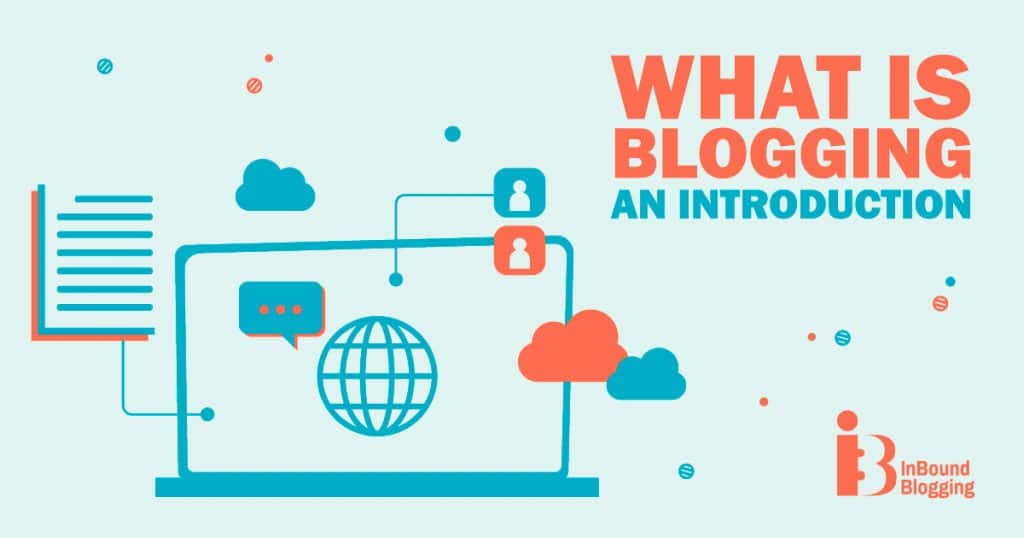If you’re asking “What is blogging?” and why it is so popular among today’s brands, it’s important to know that blogging started as a way for people to share thoughts, insights, and opinions online.
Virtually anyone can start and publish a blog, using common platforms like WordPress or Wix. Furthermore, it’s also one of the most effective ways to generate attention for a brand.
With blogs, organizations can demonstrate thought leadership, educate their audience, promote their products, and even strengthen their position on search engine result pages (SERPs).
To find out more about blogging and how to get started, keep reading below.
Blogging Explained [Key Takeaways]
- Blogging began as a personal platform for sharing insights and has evolved to boost brand visibility and credibility.
- A blog post is a singular webpage focused on a specific topic, often optimized for SEO to enhance search engine rankings.
- Different blog post types include listicles, how-to guides, and opinion pieces, each serving unique purposes.
- Blogging benefits businesses by improving SEO, establishing thought leadership, and offering monetization opportunities like affiliate marketing.
- Successful blogging requires a strategic approach, including knowing your audience, using varied content styles, and promoting consistently.
- Time and creative effort are crucial, with results often taking time to materialize.
- A blogging platform helps create and manage content, and understanding SEO is vital for increasing blog visibility.
What Is Blogging?

Blogging refers to writing and publishing content on a website or web page. When blogging, marketers or individuals combine text, photos, and other digital assets into an online document that users can access for educational or entertainment purposes.
Most website-building tools and applications come with solutions specifically designed to help users write, publish, and optimize blogs according to search engine optimization (SEO) standards.
A Brief History of Blogging
Blogging has evolved significantly since its inception in the late 1990s. Initially, blogs served as personal online diaries where individuals shared their thoughts and experiences.
The term “weblog” was coined by Jorn Barger in 1997, and shortly after, platforms like Blogger (1999) and WordPress (2003) emerged, making it easier for anyone to create and maintain a blog.
As the 2000s progressed, blogging gained popularity among various demographics, becoming a platform for not just personal expression but also professional content creation. By the mid-2000s, blogs began to influence mainstream media, with many bloggers transitioning into journalism and impacting public discourse.
The rise of social media further transformed blogging, integrating it into broader communication channels and allowing for real-time interaction between bloggers and their audiences. Today, blogging encompasses diverse genres, from travel and food to politics and technology, reflecting its adaptability and enduring relevance in digital culture.
What Is the Purpose of a Blog?
Originally, blogging was introduced as a tool to allow anyone to share their thoughts and feelings online. It was a popular way of connecting with others through the internet, even in the early days of the web. Over the years, blogs have become an invaluable tool for businesses, allowing them to create pages capable of capturing the attention of Google with specific keywords.
Blogs allow companies to publish “thought leadership” content, articles, and other information on their website for customers to read. Many entrepreneurs, professionals, and businesses have their own blogs, where they can talk about topics relevant to their industry and consumers.
Notably, there are many different styles of blogs. For instance, a “lifestyle blog” is an excellent solution designed to provide users with tips and insights connected to various parts of their lives. Writers might publish content related to travel, home design, health, and beauty. A “company blog,” on the other hand, is content published by a business to help promote an organization.
Blogging for business is incredibly beneficial, even highly recommended. Company blogs can include informational and how-to content, but they also focus on highlighting the features and valuable components of their products and services. The most common uses for blogs include:
- Helping companies and individuals to rank on search engine pages
- Sharing information about a specific topic and showing expertise
- Attracting visitors to websites so they can be turned into leads
- Engaging with and building an online community for a brand
Blog vs Website
The main difference between a blog and a website is that a blog is regularly updated with new content in chronological order, while a website is a collection of static pages that provide information about a particular topic or business.
A blog is typically a section of a website or a standalone platform. Blogs encourage reader interaction through comments and social sharing, fostering community engagement around topics ranging from personal experiences to industry insights. In contrast, a website serves static information that may include various pages such as product listings, service descriptions, and contact information.
What Are the Pros and Cons of Blogging?
Blogging is commonplace in today’s business world. Around 91% of B2B marketers say their organizations use blogging and content marketing, while 86% of B2C marketers say the same. Blogging can bring a wealth of benefits when used correctly, from enhancing your SEO standing to strengthening relationships with customers or even driving traffic to your website.
Here are the pros and cons of blogging.
Pros of blogging:
- Improved SEO: Most online interactions in today’s world start with a search on a platform like Google. To ensure you can connect with your target audience, you need to ensure your pages appear on the first page of Google’s search results. This requires the use of blog content primed with SEO components, such as keywords, and links. Search engines love new content, so the more blogs you produce, the more you’re likely to rank. Here’s how blogging helps SEO.
- Customer engagement: Blogging started as a way for people to engage followers with stories about themselves. Now, it helps businesses to communicate with customers in a way that strengthens relationships and rapport. Blog posts can keep consumers up-to-date on what’s happening within your company, and provide them with useful information, which improves their perception of your brand. Blogging can also be used as a tool to sell products.
- Income opportunities: Blogging is one of the ways to make money online. Individuals can use blogs as a way of securing an additional source of income. Affiliate marketing strategies and ads on a blog can generate money for publishers. Additionally, professional bloggers can sell their services to agencies and companies on a freelance basis. Some people are even paid to create content such as guest posts.
- Thought leadership: Blogging can be an excellent way to demonstrate the expertise and knowledge of an individual or brand. By sharing useful details about a crucial topic, a company can highlight its value to its target audience, and differentiate itself from the competition. Blogs can also be a good way to strengthen brand authority.
- Organic growth: Blogs allow companies to grow their presence online organically, without having to rely on paid advertisements and promotions. The more you blog, the more your presence grows naturally, leading to an excellent return on investment. Blogs also require very little initial investment for most companies and individuals, so they’re considered a cost-effective strategy for growth.
Cons of blogging:
- Time-consuming: Successful blogs need to be well-written, researched, and engaging. Unfortunately, this requires a lot of time and effort on behalf of bloggers. At the same time, companies generally need to create posts on a consistent blogging schedule so they can continue to drive people back to their website as often as possible.
- Creative demand: Blogging requires that people constantly come up with new and fresh ideas so they can engage with their audience. You can’t just copy what someone else is saying online and expect to achieve results. Generating topics for new blog posts can be a complex process and may take a lot of a company’s resources.
- Slow payoff: Blogs don’t always generate results for a brand or company straight away. It takes time for a post to rank high in search engines and begin generating attention for an organization. This means you may not get a return on your investment until months after you’ve already published something.
How to Start Blogging
Starting a blog involves several key steps that can help you establish a successful online presence. First, identify your target audience. Understanding who you want to reach will guide your content creation and marketing strategies.
Next, brainstorm content ideas relevant to your niche, ensuring you maintain a steady flow of topics to engage your readers. Choosing a content management system (CMS) is crucial, as platforms like WordPress or Wix offer user-friendly tools for designing and managing your blog.
Creating a blog strategy that includes an editorial calendar will keep your posts organized and timely, helping you plan what to publish and when. Pay attention to article structure and incorporate various post styles to keep your content fresh and appealing.
Finally, promote your blog through social media and consider guest blogging to expand your reach and connect with new audiences.
Different Types of Blog Posts
A blog post is an individual page on a website that covers information about a specific topic.
Blog posts can take various forms, each serving unique purposes and engaging audiences in different ways. Here are the most popular types:
- List posts (listicles) are popular for their straightforward format, presenting information in an easily digestible list, making them ideal for quick reads.
- How-to guides provide step-by-step instructions on specific topics, empowering readers to learn new skills or complete tasks effectively.
- Personal stories allow bloggers to connect with their audience on a deeper level by sharing experiences and insights, fostering relatability and trust.
- Opinion pieces express the blogger’s views on current events or trends, encouraging discussion and debate among readers.
- Interviews with experts or influencers offer valuable insights and diverse perspectives, enhancing the blog’s credibility.
- Reviews evaluate products or services, helping readers make informed decisions.
Each type of blog post contributes to the richness of online content and caters to varied reader interests. For instance, if your company shares information about content marketing, you might write about how long a blog post should be.
How to Promote a Blog
Promoting a blog effectively requires a strategic approach to reach and engage your target audience.
First, leverage social media platforms such as Facebook, Twitter, and Instagram to share your posts and connect with followers. Creating visually appealing graphics or snippets can enhance engagement on these platforms.
Next, consider optimizing your content for search engines (SEO) by using relevant keywords, meta descriptions, and alt tags for images, which can help increase organic traffic. Email marketing is another powerful tool; building a subscriber list allows you to notify readers about new posts directly.
Networking with other bloggers through guest posts or collaborations can also expand your audience by tapping into their followers.
Finally, participating in online communities or forums related to your blog’s niche can drive traffic and establish your authority in the field. Consistency and interaction with your audience are key to building a loyal readership.
How Can You Make Money Blogging?
Starting a blog, whether it’s a personal blog, a food blog, or a blog for business purposes, often sparks the question: Can you turn your passion into a source of income? The answer is yes.
First and foremost, to make money blogging, driving traffic to your blog is essential. The more eyes you have on your content, the greater your potential income through advertisements and affiliate marketing.
One of the most common methods to monetize a blog is through affiliate marketing. This strategy involves promoting products or services that align with your blog content. Each time a reader makes a purchase through the affiliate links on your blog, you earn a commission.
Another way to generate income is through blog advertising and sponsored posts. As your blog gains traction and attracts a consistent flow of visitors, advertisers may be keen to collaborate with you to reach your audience.
As you can see, blogging offers not just a platform for sharing ideas but also an opportunity to create a sustainable income stream. However, the key to success is finding a balance between delivering valuable content to your target audience and incorporating monetization strategies.
With so many choices available, discover which ad platforms align perfectly with your business goals in my article about the best Google AdSense alternatives.
Tips for Successful Blogging

While anyone can start a blog and begin publishing content, this doesn’t necessarily guarantee that the blog will be successful. Producing an effective blog takes time, commitment, and effort.
Here are some key things bloggers need to consider in order to thrive:
- Always have a calendar: Creating a content calendar is often important for blog owners, as it helps to ensure they’re frequently publishing fresh pieces for their audience to enjoy. You can determine how frequently you need to publish new blogs by checking other competing brands’ patterns in your industry.
- Assess the competition: Take the time to check out the blogs being produced by competing brands for insights into the kind of content you should be writing. You can use these blogs for inspiration, as well as to look for content gaps for topics they haven’t covered.
- Know your audience: Make sure you know who you’re writing for. Create a user persona with demographic information and behavioral insights into the people you most want to read your blogs. This will help to ensure you’re answering questions they care about, and speaking the right language.
- Explore monetization opportunities: If you want to grow your blog and make money blogging, you’ll need to explore a range of options. You might decide to include ads on your website, or you could work with a company to refer consumers to their website.
- Learn about SEO: Blogs need to be able to appeal to both human readers and search engines. Learning about the basics of SEO, such as how to use keyword research and links, should improve your blog’s ranking potential, and generate more opportunities.
- Use various blog styles: Explore different styles of content to connect with various audience members. You could write list-based blogs, how-to posts, and thought leadership content. You could even combine your blogs with videos and infographics.
- Update old content: Remember to regularly go back to your old blogs and update them with new and fresh information, so they can continue to attract new customers. You might even be able to repurpose some of your old blogs into new YouTube videos, eBooks, and articles.
- Promote your blog: Promoting a blog is essential to attract readers seeking a better understanding of your content, product, or service. By highlighting personal storytelling, niche exploration, and community building, you can draw attention to your insights while elevating the conversation on blogging’s impact and opportunities online.
Conclusion
Whether you’re a freelancer looking for a new source of income, someone who wants to share their expertise online, or a business searching for growth, blogging could be an excellent tool.
It’s a phenomenal way to draw attention to your company website and build lucrative relationships with the people most likely to support your business.
Discover profitable freelance writing niches and get ready to start your first blog.
FAQ
What is a blogging platform?
If you want to create a blog, you must first choose a blogging method and platform. A blogging platform is a software or service that allows you to create and manage your blog posts. It provides you with the tools and features necessary for publishing and organizing your content.
What do you need to start a blog?
To start blogging, you need to decide on a topic or niche, pick a domain name for your blog, and sign up for web hosting or a free blogging platform like WordPress, Blogger, or Medium.
How much does it cost to start a blog?
The cost of starting a blog can vary. You can start for free on some platforms, but for a self-hosted blog, it may cost around $50 to $100 per year for domain and hosting.
How can I make my blog look appealing?
You can make your blog look better by choosing a visually appealing blog template or theme. Depending on the hosting platform you’re using, you can customize the colors, fonts, and design elements to match your brand or personal style. Additionally, use high-quality images and include multimedia elements like videos or infographics to enhance the visual appeal of your blog.



